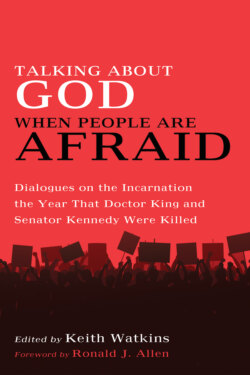Читать книгу Talking About God When People Are Afraid - Группа авторов - Страница 7
На сайте Литреса книга снята с продажи.
Acknowledgments
ОглавлениеI am grateful to Tom McCormick for the extended conversations about University Christian Church that we shared while this book was taking shape. Because his ministry at the University of Washington and his membership in University Christian Church have continued throughout the half century since we participated in this “experiment in preaching,” his insights and encouragement gave me the sense of freedom to continue the project. At a later stage, Judy Thomas Christianson and Paul E. Kidder, who were youth in the church when we preached these sermons, responded positively to my publishing these examples of their fathers’ work.
Even more, I have depended upon my daughter, Marilyn P. Watkins, who was in the sixth grade during the year that we lived in Seattle. Following graduation from college, she established her permanent home in Seattle and except for the years when she was doing PhD studies at the University of Michigan has lived in Seattle ever since. She and her late husband, Cy Ulberg, were active members of University Christian Church and this was the congregation where their family received their spiritual nurture. When visiting her through the years, I have attended worship with her and thus continued my association with the gradually diminishing number of people who heard these sermons so many years ago.
Marilyn and I have often talked about Seattle, especially the University District, and about the ministry of her church in this community. She has helped me understand the changes that have taken place during more than five decades of passing time. Her comments were especially helpful as I drafted the essay that introduces this “experiment in preaching.” Her work for many years as policy director for the Economic Opportunity Institute in Seattle is in its own way an expression of values exemplified by University Christian Church and affirmed in sermons such as those in these Dialogues on the Incarnation.
Soon after completing the transcription of these sermons and drafting an essay describing the context within which we had performed our “experiment in preaching,” I asked my colleague and friend, Ronald J. Allen, to read them and offer his comments. He encouraged me to complete the project and seek publication, and he has advised me along the way. I am grateful for his support in the publishing process and his willingness to write the Foreword which sets forth so clearly the reasons why these sermons from long ago deserve to have a continuing life.
During that tumultuous year in Seattle I wrote a book entitled Liturgies in a Time When Cities Burn (Abingdon, 1969). The statement I used in my dedication holds true even now: To the members and staff of University Christian Church, Seattle, 1967–68, and especially Robert A. Thomas: “I was a stranger and you welcomed me.”
1. Howe, Miracle of Dialogue.
2. A movement in scholarship in preaching under the heading of “conversational preaching” does envision the sermon as having the characteristics of a conversation in its search for an adequate interpretation of God’s presence and purposes. However, the authors in this field envision much conversational preaching as conversational in spirit and theological perspective but monological in expression from the pulpit. The single voice of the preacher leads the congregation in a conversation about the ideas important to the sermon e.g., Allen, The Homiletic of All Believers; Allen and Allen, The Sermon Without End.
3. The classic work is McClure, The Roundtable Pulpit. Cf. Howe, Partners in Preaching.
